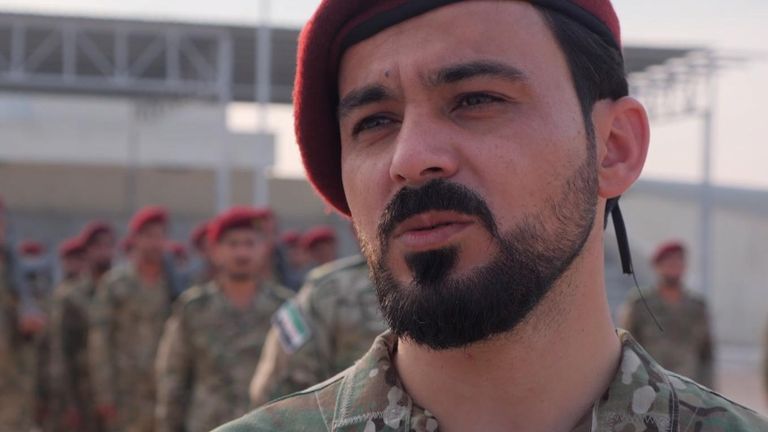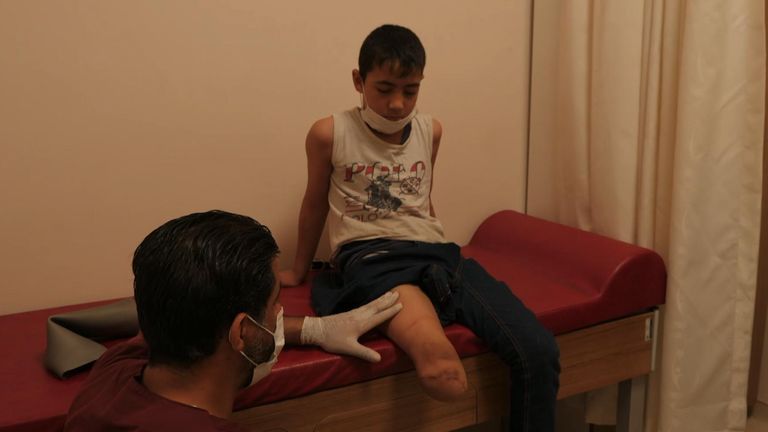
'If there are symbols of just how indebted the Syrian opposition forces are to Turkey, then the new army base in Aleppo Province for its elite al-Hamza division is evidence of this.
The Turkish red crescent flag is given as much prominence as the Syrian opposition one.
In the grand greeting rooms where commanders and visiting dignitaries will meet to discuss tactics, it is the Turkish flag which is placed side-by-side with that of the opposition's.
The commander is a defector from the start of the civil war in 2011, who used to work in Bashar al-Assad's intelligence unit.
He is anxious to press home time and again the same twin messages.
"We are not extremists," Commander Saif Abu Baker of al-Hamza Divison says repeatedly.
"ISIS has not gone. There are 3,000 ISIS fighters in the desert of east Syria being supported by Assad's régime and the separatist PKK (Kurds). They will only go if we, the opposition, are supported and the régime is finished."
The Syrian National Army, as it is now called, was born out of the Free Syrian Army and is largely backed by Turkish funds and Turkish weaponry.
Without Turkish support, it's unlikely the opposition would be able to hold the so-called buffer zone.
It's an area where Turkish troops have moved 30km inside Syria and stretch nearly 100km along the border - pushing out ISIS fighters but also the Kurdish-dominated SDF and keeping Assad's régime troops at bay.
"We have no choice," Commander Moatasm Abbas of the Al Moatasm Division said. "We either fight with what weapons we've got or we die. Withdrawing is not an option. It does not exist in our dictionary. Our dictionary is revolution. We are continuing with what weapons we have, whatever happens, and Turkey is the only one who is with us on the ground, with its weapons and military equipment."
Turkish President Recep Tayyip Erdogan has always insisted he does not want to remain inside Syria indefinitely and his troops respect the sovereignty of their neighbour.
But withdrawal is unlikely to come anytime in the near future - and those we spoke to in the buffer zone know only too well that the tenuous hold on the stability that they have in the area, is dependant right now on the Turkish military presence.
When we visit Al Bab, in the centre of the town square, once an ISIS stronghold where they planned attacks on Aleppo, there's now a huge red Turkish crescent.
The shops and stalls are bustling with business and packed with people.
But whilst we are there, there's a vehicle explosion.
A car parked outside a mosque has been rigged with a small amount of explosives.
Not enough to kill, although four people were injured, but enough to scare and frustrate the people of Al Bab who are weary of constant instability and desperate for change.
One man standing over the mangled wreckage of the car tells us: "We have terrorists here... they're ISIS terrorists and the are the separatist parties, the Kurds. They are doing this... causing all these attacks... it's the PKK and ISIS and we have suffered from this for a long time. Since we were liberated until now, we're suffering from this. We are sending a message to the world to please find a solution."
In the new 200-bed hospital built by the Turkish authorities in Al Bab, we find the battered and mutilated war wounded.
Abdul Rahman, 9, has not known anything but war his entire life.
His leg was blown off by a régime bomb, but for the first time he's been fitted with a prosthetic limb courtesy of the Turkish-run health facility which has seven operating rooms.
Prosthetics which would cost between $5,000 to $10,000 are being provided free by the hospital.
Turkey seems to be the country which is metaphorically and physically holding out its hand to help the battered people opposed to Bashar al Assad and who've been running from his régime - many since 2011.
"I don't want war," says nine-year-old Abdul Rahman.
"I can't take it. Assad has ruined everything." '

The Turkish red crescent flag is given as much prominence as the Syrian opposition one.
In the grand greeting rooms where commanders and visiting dignitaries will meet to discuss tactics, it is the Turkish flag which is placed side-by-side with that of the opposition's.
The commander is a defector from the start of the civil war in 2011, who used to work in Bashar al-Assad's intelligence unit.
He is anxious to press home time and again the same twin messages.
"We are not extremists," Commander Saif Abu Baker of al-Hamza Divison says repeatedly.
"ISIS has not gone. There are 3,000 ISIS fighters in the desert of east Syria being supported by Assad's régime and the separatist PKK (Kurds). They will only go if we, the opposition, are supported and the régime is finished."
The Syrian National Army, as it is now called, was born out of the Free Syrian Army and is largely backed by Turkish funds and Turkish weaponry.
Without Turkish support, it's unlikely the opposition would be able to hold the so-called buffer zone.
It's an area where Turkish troops have moved 30km inside Syria and stretch nearly 100km along the border - pushing out ISIS fighters but also the Kurdish-dominated SDF and keeping Assad's régime troops at bay.
"We have no choice," Commander Moatasm Abbas of the Al Moatasm Division said. "We either fight with what weapons we've got or we die. Withdrawing is not an option. It does not exist in our dictionary. Our dictionary is revolution. We are continuing with what weapons we have, whatever happens, and Turkey is the only one who is with us on the ground, with its weapons and military equipment."
Turkish President Recep Tayyip Erdogan has always insisted he does not want to remain inside Syria indefinitely and his troops respect the sovereignty of their neighbour.
But withdrawal is unlikely to come anytime in the near future - and those we spoke to in the buffer zone know only too well that the tenuous hold on the stability that they have in the area, is dependant right now on the Turkish military presence.
When we visit Al Bab, in the centre of the town square, once an ISIS stronghold where they planned attacks on Aleppo, there's now a huge red Turkish crescent.
The shops and stalls are bustling with business and packed with people.
But whilst we are there, there's a vehicle explosion.
A car parked outside a mosque has been rigged with a small amount of explosives.
Not enough to kill, although four people were injured, but enough to scare and frustrate the people of Al Bab who are weary of constant instability and desperate for change.
One man standing over the mangled wreckage of the car tells us: "We have terrorists here... they're ISIS terrorists and the are the separatist parties, the Kurds. They are doing this... causing all these attacks... it's the PKK and ISIS and we have suffered from this for a long time. Since we were liberated until now, we're suffering from this. We are sending a message to the world to please find a solution."
In the new 200-bed hospital built by the Turkish authorities in Al Bab, we find the battered and mutilated war wounded.
Abdul Rahman, 9, has not known anything but war his entire life.
His leg was blown off by a régime bomb, but for the first time he's been fitted with a prosthetic limb courtesy of the Turkish-run health facility which has seven operating rooms.
Prosthetics which would cost between $5,000 to $10,000 are being provided free by the hospital.
Turkey seems to be the country which is metaphorically and physically holding out its hand to help the battered people opposed to Bashar al Assad and who've been running from his régime - many since 2011.
"I don't want war," says nine-year-old Abdul Rahman.
"I can't take it. Assad has ruined everything." '

No comments:
Post a Comment